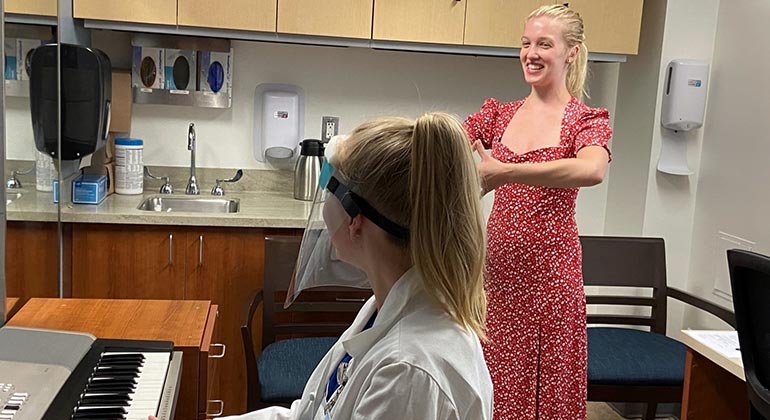
Performance and Professional Voice Care at Mount Sinai
When your voice is central to your profession, experiencing a voice problem can be devastating. Even a subtle voice change can make it difficult to meet one’s daily vocal demands. We typically think of professional voice users as performers, singers, and actors, however there are a number of professions that require athletic voice use: teachers, attorneys, fitness instructors, news anchors and many more use their voice extensively throughout the day. These professions can put one at risk for developing a voice injury or disorder, which can negatively affect one’s job, income, and mental health.
At the Grabscheid Voice and Swallowing Center of Mount Sinai, our team of highly trained laryngologists and speech-language pathologists are specialized in the care of the performance and professional voice. We utilize an interdisciplinary team approach to offer you individualized treatment, which may include behavioral, medical, and surgical interventions. Our ultimate goal is to get you back to work as quickly and safely as possible while also instilling essential vocal skills that set you up for a sustainable career using your voice.
Common Performance and Professional Voice Disorders
- Phonotraumatic/vocal cord lesions: these are injuries to the vocal folds caused by chronic inefficient use and/or overuse of the voice such as nodules, hemorrhage, polyps, or vocal fold scarring. Symptoms may include changes in voice quality, increased effort to speak or sing, reduced endurance, prolonged warm up time, loss of range, difficulty sustaining pitches, onset delays, vocal fatigue, or need for long periods of vocal rest.
- Muscle tension dysphonia: this is when the voice is being used with too much muscle tension, and can cause vocal symptoms such as strain, fatigue, increased effort with voicing, loss of range, loss of volume, and vocal instability.
It should be noted that professional voice users are vocal athletes – when a pitcher’s shoulder is injured during their baseball career, we are not surprised by this. Sports athletes have coaches, sports physicians, orthopedic surgeons, physical therapists, and athletic trainers all standing beside them while they go through recovery. Athletes also train over a lifetime and learn new ways of keeping themselves in shape throughout the course of their career. It is not uncommon for performance and professional voice users to experience vocal injury or vocal difficulty at some point in their career. At the Grabscheid Voice and Swallowing Center, our team emphasizes creating a safe space for our vocal athletes, away from the stigma around vocal injuries. We are passionate about guiding our patients through recovery and into career longevity.
When to Seek Help for Your Voice
It is important to know your voice and its baseline capabilities. For professional voice users, it is beneficial to have a baseline vocal fold exam when you’re feeling healthy. This way when a problem arises we have imaging to compare to and your voice care team is already ready to go.
If you’re experiencing a mild vocal problem that persists for 2 weeks, it is recommended to seek medical advice. If a sudden, or moderate to severe vocal problem arises, it is best to seek medical advice as soon as possible.
In general, the voice should not experience symptoms or negative changes following voice use. If you experience voice quality changes, vocal fatigue, vocal strain, etc., these are all symptoms that should be evaluated.
Who Should Be On Your Voice Care Team
Our onsite interdisciplinary voice care team includes laryngologists and voice-specialized speech language pathologists.
Laryngologists are ENT physicians that have done additional specialized fellowship training in voice. While a general ENT physician may be able to evaluate your vocal folds, they likely do not have the specialized training or equipment to diagnosis subtle vocal fold changes. At the Grabscheid Voice and Swallowing Center, our laryngologists use top of the line videostroboscopy equipment to evaluate the vocal folds, which allows for specific and fine-tuned diagnosis. Additionally, our laryngologists specialize in minimally invasive procedures, such as in-office laser treatments as well as voice surgery.
Voice specialized speech-language pathologists (SLP) are also an essential member of your voice care team. SLPs are trained in the behavioral management of voice and use knowledge of voice science, anatomy and physiology, and evidence based practice to help you restore function to your voice. Our SLP team includes Singing Voice Specialists, who have extensive training in singing and performing in addition to their speech pathology credentials. Depending on the nature of the voice problem, patients can often improve their voice through rehabilitative voice therapy and may not require surgical intervention.
Our team also collaborates with singing teachers (vocal technique trainers), vocal coaches (artistry, musicality, and style trainers), physical therapists, massage therapists, performance psychologists, and other medical specialties such as allergy and gastrointestinal teams to provide holistic management of the voice.
What to Expect from Your Voice Care Appointment
At your first visit, you will be evaluated by both a laryngologist and speech language pathologist at the same time. They will gather extensive history about your voice, listen to you speak and sing, obtain thorough video imaging of your vocal folds through videostroboscopy and then make recommendations for any voice therapy, medical, or surgical intervention.